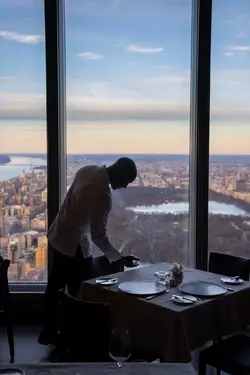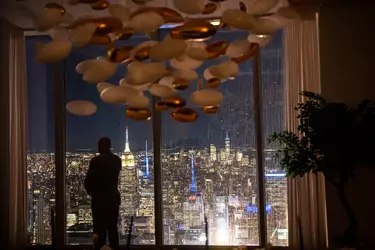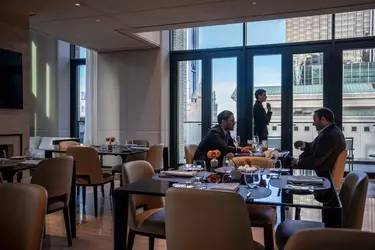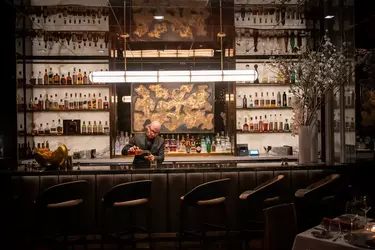
Ashley Gilbertson for The New York Times
By Dionne Searcey
Jan. 22, 2025 Updated 8:50 a.m. ET
As the chef at 10 Cubed in New York City, Nduvo Salaam prepares dishes that blend his African-Caribbean roots with classic French technique on the 100th floor of Central Park Tower — one of the tallest residential buildings in the world.
But it can be lonely at the top.
The restaurant, 1,000 feet in the air and overlooking Central Park, is among about a dozen in the city open only to residents of luxury apartment buildings and their guests, a globally elite clientele that many chefs would be thrilled to serve.
But traffic at Mr. Salaam’s restaurant is sometimes slow. And while he toils in relative splendor with views that look down on passing helicopters and other skyscrapers, his work can feel anonymous. After all, this is the age of celebrity chefs on TV and Instagrammable dishes that create long lines outside restaurants. Even some private chefs who work in home kitchens have developed big followings on social media.
“You have public restaurants, and those chefs everyone knows. And then private chefs — they’re starting to make their way out,” said Mr. Salaam, seated at a table in his own restaurant where he sank a spoon into one of his signature dishes: a small square of fluffy honeynut pumpkin custard with sweet garlic, Ossetra gold caviar and a subtle red curry topped with a delicate, latticelike coriander cracker, for $38.

Among Chef Salaam’s signature dishes is fluffy honeynut pumpkin custard with sweet garlic, Ossetra gold caviar and a subtle red curry topped with a delicate, latticelike coriander cracker. Ashley Gilbertson for The New York Times
“I’m in this hidden bubble,” he said.
Mr. Salaam occupies a rare position at the intersection of luxury living, fine dining and exclusivity.
The towers that have sprouted along Billionaires’ Row and elsewhere in New York are in competition for buyers among the top slice of the wealthiest 1 percent. Each building tries to outdo the others with spas, cold plunge pools, infinity pools, fleets of Pilates Reformer machines, steam rooms and other amenities tacked onto the cost of apartments that already are in the tens of millions of dollars. A five-bedroom, full-floor unit on the 113th floor of Central Park Tower, for instance, lined by walls of glass and custom millwork and featuring imported stone countertops and dueling showers in the master bath, starts at $59.5 million.

A view of Manhattan from an apartment on the 113th floor of Central Park Tower on West 57th Street, part of “Billionaires’ Row.” Ashley Gilbertson for The New York Times
In these buildings, offering a private restaurant where residents can pick from menus developed by Michelin-starred chefs is becoming de rigueur.
“For a certain clientele, they expect a certain level of dining if you’re paying over $3,000 a square foot for your home,” said Kent Wu, a real estate agent at Douglas Elliman who last year was part of a team that sealed a $115 million deal on an apartment at Central Park Tower.
At One Wall Street, residents can enjoy meals by the chef Alejandro Cortez while dining al fresco on the 4,500-square-foot terrace overlooking New York Harbor. The restaurant at the skinny luxury tower at 432 Park Avenue is overseen by the Michelin-starred chef Shaun Hergatt.
“I get to offer the clients a world-class dining experience plus a lifetime memory,” said Mr. Hergatt, who is opening another private restaurant in Miami Beach at the Perigon, a beachfront luxury complex that is under construction.
If they actually sit down for a meal.
Brokers who buy and sell units in the luxury buildings say these restaurants are often empty. That’s largely because their wealthy residents are busy zipping between apartments in other cities and countries. When they do breeze into New York, one of the great restaurant cities of the world, who wants to eat at home?
The restaurants host events to lure residents inside: whiskey night or wine tastings or guest chefs to curate meals. But most of them stay afloat with funding from the buildings’ steep maintenance fees or requirements that residents spend a minimum monthly amount dining there. At 432 Park, residents at one point were required to spend $15,000 a year at the restaurant.
“It’s the only way to keep them going,” said Kirk Rundhaug, sales director at the realty firm Compass, who has sold units in luxury buildings with private restaurants.
Foie gras for one

10 Cubed is often quiet. On a recent night, a couple finished their meal about 7 p.m. and left the restaurant, which stayed empty the rest of the night. Ashley Gilbertson for The New York Times
On a recent evening, 10 Cubed in Central Park Tower was glowing. The city lights sparkled below, and the room was lit by a swirly Rubelli fiber-optic ceiling designed to mimic the night sky. A couple finished their meal about 7 p.m. and left the restaurant, which stayed empty the rest of the night. Two parties that had reserved tables didn’t turn up. Unlike other high-end restaurants that charge steep fees for no-shows, 10 Cubed does not penalize its residents.
Mr. Salaam, who is 49 and tall with squared shoulders and a quiet presence, looked across the room that seats up to 40 and sighed.
“If you’re at Per Se or Le Bernadin, you can’t not show up without being charged,” he said.
He pulled up a chair for a meal in his own restaurant “to have the full experience and to see how the guys are selling the art,” he said with a laugh, as he sipped from a glass of 2015 Dom Pérignon while he waited to be served.
A waiter approached, hoisting plates, a napkin folded across his forearm just so. A $46 starter had arrived: foie gras terrine with Sicilian pistachio praline, gewürztraminer gelée and toasted brioche.
Mr. Salaam was born in Jamaica to a Jamaican mother and Nigerian father. His mother thought it was important that her three sons learn to cook, not just her daughter, so she gave them lessons. He realized one day that he was alone in the kitchen cooking with his mom; his brothers had lost interest.
In Kingston, Mr. Salaam spent time with his aunt, who was part of the city’s upper crust. By the time he was 4, she had taught him what the British consider proper utensil etiquette: keeping his fork in his left hand while eating.
“There were a portion of Jamaicans I grew up with who still would do some things that they learned from their colonizers,” said Mr. Salaam.
When he was 8, he moved with his mother to Brooklyn and later Harlem, enrolling at Saunders Trade and Technical High School in Yonkers, where he studied culinary arts. He stayed in the same field after getting a scholarship to Johnson & Wales University in Rhode Island.
Afterward, he immersed himself in the world of fine dining with low-level positions at some well-known New York restaurants, including Union Pacific; the Palace Hotel; Le Cirque in the days when young Donald Trump, Martha Stewart and the Hilton family were regulars; and Jean-Yves Schillinger’s restaurant in Colmar, France.
The work was sometimes grueling. Bosses were sometimes cruel. Once, when he was working in the kitchen at Blue Smoke, Danny Meyer’s Battery Park City restaurant, which closed in December, his pay was docked by a head chef for reasons he still doesn’t know, he said.
“When I started, I was usually the only one in the kitchen that looked like me, so the question was always, ‘How did you get here?’ They would try every trick in the book to mess with me,” he said.
Food suppliers would brush past him in the kitchen without a word and talk instead to the head chef. As a young chef, Mr. Salaam was curious to learn what they were hawking.
Only one vendor, a fishmonger named Louis Rozzo, would stop and talk to him. One day he asked him why.
“He said, because I’m going to need your business when you became chef,” Mr. Salaam said. “At that point, I never even saw myself as being a chef.”
It was a transformative moment.
“I knew failure was not an option,” he said. “While everyone would go out drinking after the shift, I would be studying. I just put my head down and really learned the craft. Then one day I picked my head up and was confident.”
He became chef de cuisine at BLT Market in Midtown and had a baby, but he and the baby’s mother split up. He went on to become executive chef at NoMo in SoHo and executive chef at the Roosevelt Hotel.
In 2017, he went out on his own and opened a small restaurant called Cafe on Ralph in Brooklyn. He married one of his customers. A victim of the pandemic, the restaurant closed in 2022.
“I tried to hang on as much as I could,” he said.
Cooking for the 1 percent

There are about a dozen private restaurants in Manhattan. At Boulud Privé, at the Mandarin Oriental Residences on Fifth Avenue, residents are offered room service with a menu designed by the Michelin-starred chef Daniel Boulud. Ashley Gilbertson for The New York Times
Mr. Salaam signed onto 10 Cubed initially just for its opening. The kitchen, a relatively small, windowless space, was built around him as the tower shot upward, joining the ranks of other luxury apartment buildings, including those known as “supertalls” on Billionaires’ Row.
“I have some people who have specifically bought into these buildings I sell because of the restaurant,” said Jade Chan, sales director of the Mandarin Oriental Residence who is one of the stars of the new Netflix reality show “Selling the City.” The building is home of Boulud Privé, a private restaurant that even offers room service to residents with a menu designed by the Michelin-starred chef Daniel Boulud, where roasted chicken breast with rosemary-smashed potatoes is on the lunch menu for $31. “The definition of luxury has evolved into simple ease and convenience. The most important thing to all of us, no matter how much money you have, is time.”
Private restaurants in residential buildings were popular during an earlier period that parallels the extraordinary wealth and inequality in New York City of today: the late 1800s and early 1900s, known as the Gilded Age. The Dakota, one of the city’s first luxury apartment buildings, had a private dining room. So did the Ansonia, which also featured a fountain in the lobby with actual baby seals.
“When the luxury apartment buildings became a trend in the 1880s, they were seen as suspect and déclassé compared to having a brownstone,” said Vincent DiGirolamo, an associate professor of history at Baruch College.
The exclusive dining rooms were part of what helped establish the buildings’ allure in a city that back then had a thriving elite class, even as two-thirds of the rest of the population crowded into tenements.
At 10 Cubed, other chefs from Michelin-starred restaurants — Alfred Portale, Laurent Tourondel and Gabriel Kreuther — lent their names to the first menu to help create buzz.
Mr. Salaam stayed on. The outlook for the post-pandemic restaurant industry was still murky. He had a new baby at home.
He built a team around him, pulling in workers he had met at prior restaurant jobs or who were celebrated in New York’s fine dining scene. Louie McCullagh, the former fine dining captain of the Four Seasons restaurant, is one.
At 10 Cubed, everything is made on the spot, partly to adhere to quality but also because it’s wasteful to stock a kitchen with food that goes uneaten. Workers and Chef Salaam himself make frequent trips down the elevator and downtown to the farmers’ market at Union Square, to Chinatown or to a nearby Whole Foods.

David Libespere, the head bartender at 10 Cubed, prepares a drink. Ashley Gilbertson for The New York Times
Mr. Salaam is often awakened in the middle of the night with calls from his fishmonger — Mr. Rozzo — advising him on the catch of the day. But work-life balance is reasonable at 10 Cubed, as it is not for chefs at other “public restaurants,” as Mr. Salaam calls them. Evening service wraps up relatively early. He didn’t have to work on New Year’s Eve.
Paul Freedman, a cuisine historian at Yale University, likened chefs at private restaurants to those at country clubs or upscale corporate dining rooms.
“A lot of chefs take these jobs because they’re less pressure and they pay well,” he said. “But I would imagine you get tired of it. Your customers don’t change; you get an idea of what they like. It’s all kind of predictable. This has always been a kind of stepping away from the high pressure.”
But Mr. Salaam is under pressure to please the wealthy and powerful residents of Central Park Tower. As he wandered through the cigar room in his chef’s whites the other evening, a man rose from the poker table, past the private lockers where residents can store cigars and expensive bottles of liquor, and approached him.
“You should put a bit more breakfast food on the brunch menu,” said the man. That morning, he had asked the chef to make him eggs for breakfast, off menu.
Mr. Salaam smiled and nodded.
“I’ve cooked for the 1 percent my whole career,” he said. “That’s part of why I ended up here. Not everyone can walk in off the street and do this.”
What has he learned from his years serving the elite?
“I don’t take anything personally,” he said, as a waiter offered plates of another of his creations, a dessert that was somewhere between brownie and cake, with light notes of hazelnut, topped with gold leaf beside a dollop of not-too-sweet vanilla gelato.
“People that look like me in these positions 30 years ago — it didn’t happen,” he said. By the time I got here, that thick skin had already been there.”
Mr. Salaam appreciates the perks of his position, including the view. Sometimes only the tops of other skyscrapers are visible, poking through the clouds in an otherworldly tableau. He has learned that it takes exactly four days in autumn for the leaves in Central Park to go from green to golden. Among the privileged few to eat at the restaurant is his 4-year-old daughter, who likes to point to the tower from the family’s apartment window in Long Island City, Queens.
But for chefs, being so far out of the public eye can be difficult.
“There’s a trade-off with ego,” said Stephen Zagor, a restaurant consultant and adjunct professor in food studies at New York University.
The dynamic has been tough for Mr. Salaam. He is known in the industry — but it’s not the same as if his crispy king oyster mushroom, atop a perfectly spongy bao bun with delightfully tangy pickled ginger, was subject to critical reviews and eligible for awards.
“I’m in all the rooms with all the other chefs, but obviously I don’t really look like a typical chef, and my peers are like, ‘Oh, chef, we’ve never heard of you,’” he said.
Alexander Smalls, a James Beard-award winning chef, discovered Mr. Salaam when he was scrolling through social media 10 years ago. Mr. Smalls messaged him, and the men have since become friendly. Mr. Smalls has eaten at 10 Cubed and is impressed by the food, as well as by Mr. Salaam’s humility, he said. He called him “a culinary practitioner and an artisan.”
“He is so gifted, and he isn’t getting the affirmation that most chefs get because he’s laboring in a vacuum of privilege,” Mr. Smalls said. “I would eat his food in a basement.”
Mr. Salaam said he longs for a critical eye.
“I would love to be reviewed,” he said. “Obviously, this is curated for the residents, but there’s that competitive side that would love to know what it’s like to be up against the others.”
A correction was made on Jan. 22, 2025: An earlier version of this article misspelled the name of Nduvo Salaam’s fishmonger. It is Louis Rozzo, not Louis Razzo.
Source (Archive)
